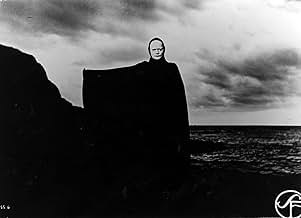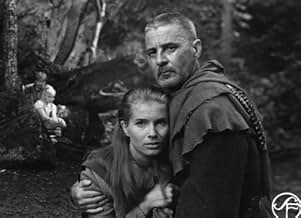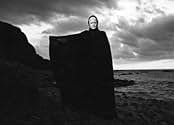A knight returning to Sweden after the Crusades seeks answers about life, death, and the existence of God as he plays chess against the Grim Reaper during the Black Plague.A knight returning to Sweden after the Crusades seeks answers about life, death, and the existence of God as he plays chess against the Grim Reaper during the Black Plague.A knight returning to Sweden after the Crusades seeks answers about life, death, and the existence of God as he plays chess against the Grim Reaper during the Black Plague.
- Awards
- 9 wins & 2 nominations total
Siv Aleros
- Flagellant
- (uncredited)
Sten Ardenstam
- Knight
- (uncredited)
Harry Asklund
- The Landlord
- (uncredited)
Benkt-Åke Benktsson
- Merchant at the Inn
- (uncredited)
Summary
Reviewers say 'The Seventh Seal' delves into mortality, faith, and existential questions through its medieval setting. The chess game with Death symbolizes humanity's struggle against fate. Themes of societal chaos and religious fervor are depicted through plague, witch burnings, and flagellants. Characters like the knight, squire, and actors provide varied perspectives on life and death, enriching the narrative. The film's allegorical approach resonates with contemporary audiences, highlighting the timeless nature of its themes.
Featured reviews
10Xstal
An abstraction of your fears, conjured progressively through years, walks beside you every day, may cause some to halt, then pray; it's a demon that's passed on, through generations come and gone, as fixed and certain as the tide, nowhere for you to run, or hide; is there a game that you can play, that extends your time and stay, with instructions and some rules, that don't leave you, as the fool; can the clock that's counting down, tick half as fast before you frown, and gaze with stoical askance, as you begin, your macabre dance.
Signed, sealed and delivered as many times as you may care for, but the curse of existence is never knowing how the story really ends, or why it was started in the first instance.
Signed, sealed and delivered as many times as you may care for, but the curse of existence is never knowing how the story really ends, or why it was started in the first instance.
This classic is filled with a lot of memorable images - from the opening scenes on the seashore to the effective concluding shots, creative thoughts are combined with some fine camera work. There are several significant or interesting questions raised by the characters - from the imagery of the "Seventh Seal" in Revelation, to their simple but important concerns about eternity - but it is the way that the visuals play off of the ideas that make the movie so worthwhile.
The recreation of the medieval world is convincing and effective, with a lot of detail to set off a varied assortment of characters with different personalities and perspectives. The characters are not necessarily very deep, but most are interesting, and are worth caring about. The ways that they deal with their discouraging situation make you wonder what it would have been like to live in their world. It's also a movie that in some respects is even better to watch over again, after you already know what has happened and can then pick up even more of the detail and imagery.
No doubt the somber tone and slow pace will always keep it from being widely popular, and it's not perfect, but it's satisfying in a different way, and deserves its reputation as a classic.
The recreation of the medieval world is convincing and effective, with a lot of detail to set off a varied assortment of characters with different personalities and perspectives. The characters are not necessarily very deep, but most are interesting, and are worth caring about. The ways that they deal with their discouraging situation make you wonder what it would have been like to live in their world. It's also a movie that in some respects is even better to watch over again, after you already know what has happened and can then pick up even more of the detail and imagery.
No doubt the somber tone and slow pace will always keep it from being widely popular, and it's not perfect, but it's satisfying in a different way, and deserves its reputation as a classic.
Painting a grim portrait of the western world plagued by the Black Death, threading together several norms of the medieval era into a single setting, and addressing its themes by observing them through contemporary lens, The Seventh Seal is a fable of life, death, religion, faith & existential angst that, despite the allegorical treatment, makes sure its narrative remains somewhat accessible.
Written & directed by Ingmar Bergman, one of the first things that stands out about this sermon is the dark & deathlike atmosphere the plot comes drenched in. Add to that, the whole premise of playing chess against the Grim Reaper with one's life on the line sounds interesting on paper. The story however piles on more subplots and digs deeper into the philosophical & spiritual elements that only slow down the ride.
The crisp black n white cinematography is captivating throughout. Characters of all moods are present in the picture. The period details may not be appropriate but the gloomy aura is finely captured. And comfortably steering the film past the finish line are the sturdy performances, led by Max von Sydow who plays a knight locked in a game with Death itself, latter personified by Bengt Ekerot. And the scenes between the two are easy standouts.
Overall, The Seventh Seal is actually easier to navigate than what I was expecting, and the parallels viewers can draw between the medieval pandemic and one we're dealing with currently makes the journey rather intriguing. Nonetheless, the relaxed pace & numbing speeches still made it a frustrating sit for me and failed to strike an emotional chord. As is the case with previous Bergman entries, I do get its legacy & repute but don't feel any personal love for it.
Written & directed by Ingmar Bergman, one of the first things that stands out about this sermon is the dark & deathlike atmosphere the plot comes drenched in. Add to that, the whole premise of playing chess against the Grim Reaper with one's life on the line sounds interesting on paper. The story however piles on more subplots and digs deeper into the philosophical & spiritual elements that only slow down the ride.
The crisp black n white cinematography is captivating throughout. Characters of all moods are present in the picture. The period details may not be appropriate but the gloomy aura is finely captured. And comfortably steering the film past the finish line are the sturdy performances, led by Max von Sydow who plays a knight locked in a game with Death itself, latter personified by Bengt Ekerot. And the scenes between the two are easy standouts.
Overall, The Seventh Seal is actually easier to navigate than what I was expecting, and the parallels viewers can draw between the medieval pandemic and one we're dealing with currently makes the journey rather intriguing. Nonetheless, the relaxed pace & numbing speeches still made it a frustrating sit for me and failed to strike an emotional chord. As is the case with previous Bergman entries, I do get its legacy & repute but don't feel any personal love for it.
One thing that can be certain after watching the Seventh Seal, outside of being thankful for living in this century, is that Bergman knows his film-making- and imagery. He uses subliminal and not so subliminal techniques to convey a dying, frightened world, where making a living is almost impossible and the debate of god's control over life is discussed like un-rhyming yet fascinating poetry.
The result is beautiful cinema, capturing the always foreboding fear and allure of the almighty and for the waiting death, appropriately staged in post-crusades, mid dark age Europe. Max Von Sydow gives an excellent showing as the opponent of Death (in a clever and meticulous chess game), yet the character of Death, played by Bengt Ekerot with chilling conviction, steals the show, if only for the alluring quality of the character.
Even if the story veers it veers in good and interesting territory, focusing on people who convey Bergman's point and or style. I can't reveal what the bottom line point is (many newcomers to Bergman's work won't either, especially if you're not in the mood for soul searching), but one thing is for certain, an allegory on life and death is shown perfectly in the second to last shot of the reaper and his minions following in a dance across the field. This is one of the most pure of cinema's masterpieces and certainly Bergman's best cine. A++
The result is beautiful cinema, capturing the always foreboding fear and allure of the almighty and for the waiting death, appropriately staged in post-crusades, mid dark age Europe. Max Von Sydow gives an excellent showing as the opponent of Death (in a clever and meticulous chess game), yet the character of Death, played by Bengt Ekerot with chilling conviction, steals the show, if only for the alluring quality of the character.
Even if the story veers it veers in good and interesting territory, focusing on people who convey Bergman's point and or style. I can't reveal what the bottom line point is (many newcomers to Bergman's work won't either, especially if you're not in the mood for soul searching), but one thing is for certain, an allegory on life and death is shown perfectly in the second to last shot of the reaper and his minions following in a dance across the field. This is one of the most pure of cinema's masterpieces and certainly Bergman's best cine. A++
First of all, I have taken the time to read some posts on this movie before writing my review because I was searching for lots of answers. Didn't get many though, the popular thing fans like to say (and please, no pun intended) is that it just takes time to understand and appreciate this movie. To this I quickly reply that my perception of "Det Sjunde Inseglet" was that it is a rather dull, if not eventless, movie. It has some really nice moments (and for some reason I really liked the concept of a man playing chess with death itself) but in the end almost nothing is resolved except from the main protagonist who, at the brink of his death, discovers that it's love that makes people want to live ,very roughly put, I apologize, but even this revelation was hidden from the writer of this comment. And this is what bothered me the most, I couldn't read (for the lack of a better word) any of these important details, the movie very coldly rolled in front of my eyes and I just didn't get it! Now the easiest and dumbest thing to say is that this is all the fault of the director for not having a more universal way of film-making, rather the viewer has to decipher such information if he wants to fully appreciate his movies. I've just realized that I could say the same for Kubrick's visionary movies, I didn't like most, scratch that, none of them the first time around, they grew on me after a second viewing. And I dig Kubrick, a lot!!!
I was also surprised with the admiration the cinematography received, it did not impact me whatsoever (and I am more so a visual that a sensual movie buff and love this kind of stuff). All in all, as Antonius Block, I am searching for answers, important ones. It bothers me a lot that I don't appreciate this movie, and I ask anyone to help me resolve my problem.
What am I missing? What don't I get? What should I know about "The Seventh Seal", its meaning, its importance, its making, its director...?
Thank you for your time
I was also surprised with the admiration the cinematography received, it did not impact me whatsoever (and I am more so a visual that a sensual movie buff and love this kind of stuff). All in all, as Antonius Block, I am searching for answers, important ones. It bothers me a lot that I don't appreciate this movie, and I ask anyone to help me resolve my problem.
What am I missing? What don't I get? What should I know about "The Seventh Seal", its meaning, its importance, its making, its director...?
Thank you for your time
Did you know
- TriviaIngmar Bergman credited the film with helping him overcome his crippling fear of death. Because the film dealt so overtly with the subject, he found it a highly cathartic experience.
- GoofsThe chess players focus on capturing the Queen. The Queen was not a super-powerful piece until centuries later when a recent chess-variant initially called "chess of the mad queen" became more popular than the classic game.
- Quotes
Antonius Block: We must make an idol of our fear, and call it god.
- ConnectionsEdited into Severed Ways: The Norse Discovery of America (2007)
Details
- Release date
- Country of origin
- Languages
- Also known as
- El séptimo sello
- Filming locations
- Hovs Hallar - Naturreservat, Skåne län, Sweden(Opening beach scene and ending scene)
- Production company
- See more company credits at IMDbPro
Box office
- Budget
- $150,000 (estimated)
- Gross worldwide
- $312,104
- Runtime
- 1h 36m(96 min)
- Color
- Aspect ratio
- 1.37 : 1
Contribute to this page
Suggest an edit or add missing content






































